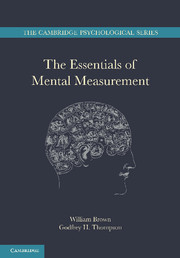Book contents
- Frontmatter
- PREFACE
- Contents
- ERRATA
- PART I PSYCHOPHYSICS
- PART II CORRELATION
- CHAPTER V INTRODUCTION TO CORRELATION
- CHAPTER VI THE MATHEMATICAL THEORY OF CORRELATION
- CHAPTER VII THE INFLUENCE OF SELECTION
- CHAPTER VIII THE CORRECTION OF RAW CORRELATION COEFFICIENTS
- CHAPTER IX THE THEORY OF GENERAL ABILITY
- CHAPTER X A SAMPLING THEORY OF ABILITY
- CHAPTER XI THE PRESENT POSITION (1924)
- CHAPTER XII THE MATHEMATICAL AND EXPERIMENTAL EVIDENCE FOR THE EXISTENCE OF A CENTRAL INTELLECTIVE FACTOR (g)
- CHAPTER XIII A TEST OF THE THEORY OF TWO FACTORS
- CHAPTER XIV RECENT DEVELOPMENTS OF STATISTICAL METHOD IN PSYCHOLOGY
- CHAPTER XV THE FACTORIAL ANALYSIS OF ABILITY
- APPENDIX I TABLES
- APPENDIX II A LIST OF DEFINITE INTEGRALS OF FREQUENT OCCURRENCE IN PROBABILITY WORK
- INDEX
CHAPTER XIII - A TEST OF THE THEORY OF TWO FACTORS
from PART II - CORRELATION
Published online by Cambridge University Press: 05 June 2016
- Frontmatter
- PREFACE
- Contents
- ERRATA
- PART I PSYCHOPHYSICS
- PART II CORRELATION
- CHAPTER V INTRODUCTION TO CORRELATION
- CHAPTER VI THE MATHEMATICAL THEORY OF CORRELATION
- CHAPTER VII THE INFLUENCE OF SELECTION
- CHAPTER VIII THE CORRECTION OF RAW CORRELATION COEFFICIENTS
- CHAPTER IX THE THEORY OF GENERAL ABILITY
- CHAPTER X A SAMPLING THEORY OF ABILITY
- CHAPTER XI THE PRESENT POSITION (1924)
- CHAPTER XII THE MATHEMATICAL AND EXPERIMENTAL EVIDENCE FOR THE EXISTENCE OF A CENTRAL INTELLECTIVE FACTOR (g)
- CHAPTER XIII A TEST OF THE THEORY OF TWO FACTORS
- CHAPTER XIV RECENT DEVELOPMENTS OF STATISTICAL METHOD IN PSYCHOLOGY
- CHAPTER XV THE FACTORIAL ANALYSIS OF ABILITY
- APPENDIX I TABLES
- APPENDIX II A LIST OF DEFINITE INTEGRALS OF FREQUENT OCCURRENCE IN PROBABILITY WORK
- INDEX
Summary
INTRODUCTION
IN a critical article by Professor Karl Pearson(1) on the Theory of Two Factors it is suggested that “some 12 to 15 abilities…the abilities being settled by psychologists a priori to avoid ‘overlaps,’ are essential to a satisfactory test [of this theory], the observations to be made on a homogeneous population of several hundreds” (p. 261). The present paper describes a test of the kind that Professor Pearson demands, using correlations for some 20 abilities. The research was organised by one of us (W. Brown) over a year ago, in connection with his re-testing of his own earlier correlational material by Professor Spearman's “tetrad criterion”(2), and he has made himself particularly responsible for the mathematical arguments and conclusions of the investigation, including the curve-fitting. But the mental tests were devised and applied by Dr W. Stephenson, and the correlation coefficients and tetrad differences were also calculated by him. Some preliminary remarks, from both psychological and mathematical viewpoints, are called for.
THE VIEWPOINT OF EXPERIMENTAL PSYCHOLOGY
The psychologist does not select the 20 abilities on a narrow a priori basis. The abilities are found by a slow process of experimentation and test refining. Moreover, this experimentation is itself based upon the theory of two factors. The psychologist devises tests that, approximately, should fit a theoretical criterion (that of zero “tetrads”).
But it betrays a misconception of the nature of a scientific theory to say that, thereby, the psychologist is working in a closed circle. On the contrary, he works like a physicist; he establishes the fact that under certain conditions the criterion is satisfied, and he determines the nature of these conditions. The core of the matter is that in this way, and generally, the theory of two factors works for psychology. When reason able agreement is found between the criterion and correlational facts, the common factor can receive an acceptable psychological explanation. When the criterion and facts do not agree the psychologist makes a determination of “ overlap,” “group factors,” or “ specificality.”
- Type
- Chapter
- Information
- The Essentials of Mental Measurement , pp. 209 - 227Publisher: Cambridge University PressPrint publication year: 2013



